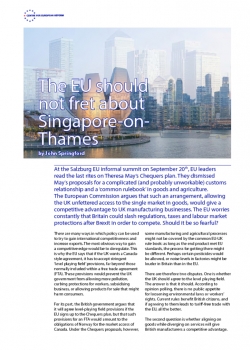
The EU should not fret about Singapore-on-Thames
At the Salzburg EU informal summit on September 20th, EU leaders read the last rites on Theresa May’s Chequers plan. They dismissed May’s proposals for a complicated (and probably unworkable) customs relationship and a ‘common rulebook’ in goods and agriculture. The European Commission argues that such an arrangement, allowing the UK unfettered access to the single market in goods, would give a competitive advantage to UK manufacturing businesses. The EU worries constantly that Britain could slash regulations, taxes and labour market protections after Brexit in order to compete. Should it be so fearful?
There are many ways in which policy can be used to try to gain international competitiveness and increase exports. The most obvious way to gain a competitive edge would be to deregulate. This is why the EU says that if the UK wants a Canada-style agreement, it has to accept stringent ‘level playing field’ provisions, far beyond those normally included within a free trade agreement (FTA). These provisions would prevent the UK government from allowing more pollution, curbing protections for workers, subsidising business, or allowing products for sale that might
harm consumers.
The #EU fears that a Chequers-style deal would give Britain a competitive advantage. They have little to fear.
For its part, the British government argues that it will agree level-playing field provisions if the EU signs up to the Chequers plan, but that such provisions for an FTA would amount to the obligations of Norway for the market access of Canada. Under the Chequers proposals, however, some manufacturing and agricultural processes might not be covered by the common EU-UK rule book: as long as the end product met EU standards, the process for getting there might be different. Perhaps certain pesticides would be allowed, or noise levels in factories might be louder in Britain than in the EU.
There are therefore two disputes. One is whether the UK should agree to the level playing field. The answer is that it should. According to opinion polling, there is no public appetite for loosening environmental laws or workers’ rights. Current rules benefit British citizens, and if agreeing to them leads to tariff-free trade with the EU, all the better.
The second question is whether aligning on goods while diverging on services will give British manufacturers a competitive advantage. There are several reasons why this is unlikely. The EU does not regulate most service inputs in the manufacturing and agrifood process. Engineering, design, marketing, cleaning factory floors and servicing machinery are regulated, if at all, largely by national authorities. Any attempt by the UK to subsidise manufacturers, or loosen labour and environmental standards, could be dealt with by level playing field provisions. The UK could in theory slash financial regulation governing lending to business (perhaps by weakening rules on securitisation or lowering capital provisions for business loans). But the Bank of England and the Financial Conduct Authority, which are independent of the government, have no incentive to do so.
The European Commission is on firmer ground in arguing that services and goods are becoming less distinct. Take smartphones: the physical product is inseparable from the services provided over the internet. Driverless cars will require regulation to govern how consumer data is used, and who is liable for accidents. However, the UK has signalled that it would prefer to remain aligned with the EU’s data regime.
The most likely outcome of Brexit is a trade relationship that is far more comprehensive in goods than services: either a Canada-style FTA, or a customs union with some regulatory bolt-ons. Either would require the UK to sign up to rules preventing regulatory competition. The UK might therefore try three other ways to seek competitive advantage. Brexit makes them more difficult.
The EU need not fear that Britain will out-compete the rest of the EU after Brexit: the reverse is all but certain.
One way would be to make higher quality products than businesses in the EU, by creating an environment conducive to innovation and foreign investment (so that the world’s best companies make their products in the UK). Brexit will make that harder. Higher trade barriers between Britain and the EU – and political uncertainty about relations with the EU, caused by Britain’s polarised politics – will make multinational companies less willing to invest. And, even if immigration policy remains relatively liberal after Brexit, the UK will probably become less attractive to the European scientists, engineers, designers and computer programmers needed to make cutting-edge products. Britain will also have less fiscal space to invest in research and innovation, since Brexit will raise the government deficit. At the UN on September 26th Theresa May pledged the lowest corporation tax rate in the G20. That would attract some companies to the UK, but would only partially offset the Brexit damage.
The second way is to become more productive. Exporters tend to produce more output per hour worked than companies that serve the domestic market. If Britain’s exporters produce more output per input than companies based in other countries, they will sell more exports. However, Brexit will tend to lower productivity, not raise it: highly productive multinationals will reduce investment in the UK; and the UK will become more closed to foreign competition, because imports from the EU will fall and UK companies will find it harder to participate in European supply chains. Both factors will lead to British companies losing their edge.
Third, Britain could try to compete on price, by holding down wages or devaluing the pound. If businesses could make the same quality products as now, but at lower prices than businesses based in other countries, that should raise exports. However, this chain of events is unlikely to happen. British companies are embedded in international supply chains, which means they combine imported components into new products for export. A cheaper currency makes British exports cheaper, but it also makes imported parts more expensive. Many British exporters invoice in dollars and euros, which means that they do not benefit from a cheaper currency. And even though British workers have gone through an extraordinary period of wage restraint (in real terms, average wages are 2 percentage points lower than their 2008 peak), exports fell as a proportion of GDP between 2011 and 2016.
Far from creating the opportunity for Singapore-on-Thames, Brexit will make Britain less competitive internationally, not more.
The EU has good political reasons for saying no to partial participation in its internal market. It is right to fear that if it offers this to the UK, others might demand the same, and the web of compromises and bargains that make up the single market might unravel. It is also perfectly reasonable to make Brexit a binary choice between ‘in’ and ‘out’ in order to demonstrate the costs of leaving to europhobes in France, Italy, Poland and Hungary. Brexiters promised a liberal, free-trading, competitive UK after Brexit. This has fed the EU’s fears that Britain will pursue a form of slash-and-burn capitalism that will undermine European markets. But they need not fear that Britain will out-compete the rest of the EU after Brexit: the reverse is all but certain.
John Springford is deputy director of the Centre for European Reform.

